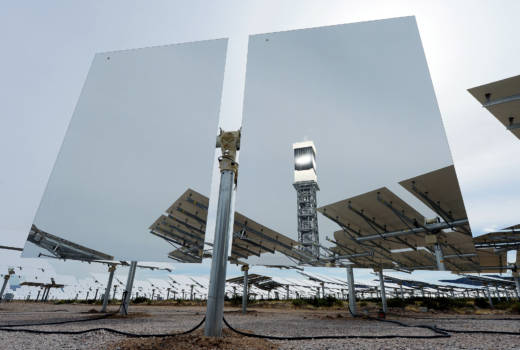California appears to be on a path toward one of the nation’s most ambitious clean-energy goals.
The Golden State, which is also the world’s fifth largest economy, would accelerate its efforts to generate most of the state’s energy from carbon-free sources and set a goal of phasing out fossil fuels entirely by 2045 under legislation approved Tuesday by state lawmakers.
If signed by Gov. Jerry Brown, the bill will require California utilities to get half their energy from wind, solar and other specific renewable sources by 2026 — four years sooner than current law requires.
They would then have four more years to get 60 percent from renewables. The 2045 deadline of phasing out fossil fuels is a goal that does not include mandates or penalties. Hawaii is the only other U.S. state that has set the future bar at 100 percent renewables.
The California measure by Democratic Sen. Kevin de Leon, who is running for U.S. Senate, got a last-minute celebrity endorsement when former Vice President Al Gore and actor and former Gov. Arnold Schwarzenegger wrote letters in support. Other actors, including Leonardo DiCaprio, Chris Hemsworth and Mark Ruffalo, have tweeted their support.
“Today, state legislators proved to the world that climate leadership is alive and well in California, even if it’s absent in Washington D.C.,” said Laura Wisland, senior energy manager at the Union of Concerned Scientists in a statement.
It was one of more than 100 bills voted on Tuesday by the Senate and Assembly as lawmakers speed toward a Friday deadline to finish their business for the year.
Most Democrats cheered the renewable energy bill as another way for California to show global leadership in addressing climate change by charting a path for other large economies to follow.
“We have to be a leader. We have to show what can be done,” said Assemblyman Bill Quirk, a Hayward Democrat. “If we can get to 100 percent renewables, others will as well.”
Quirk, a scientist who has worked on climate change research, said he wasn’t sure if the new goals were feasible, but the state must try.
Republicans, joined by a handful of moderate Democrats, said the legislation would saddle families and businesses with higher energy bills.
“Why would this body double-down and further increase costs on struggling California families?” said Steven Choi, R-Irvine.
The new goal is a big leap from the state’s current farthest-reaching goal of 50 percent renewables.
“One hundred percent is a whole other ball of wax,” says Lucas Davis, an energy economist at UC Berkeley, “because of all of a sudden you’re not being able to rely on natural gas.”
Phasing out fossil fuels would be a massive change in the energy grid. Utilities rely on natural gas plants to meet demand when renewables fall short, particularly in the early evening when the sun sets and people turn on their air conditioners as they get home from work.
Renewable energy experts have looked to batteries that can store solar energy generated in the afternoon as one possible solution, but the technology is not ready for widescale deployment.
__
Associated Press writers Kathleen Ronayne, Don Thompson and Sophia Bollag, as well as KQED Science staff contributed to this report.
